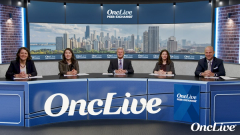
Opinion|Videos|June 24, 2024
Treatment Strategies for NSCLC with Non-Actionable Mutations
Mark Socinski, MD; Helena A. Yu, MD; Zosia Piotrowska, MD, MHS; Julia Rotow, MD; and Benjamin Levy, MD, provide a concise overview of current first-line treatment options for non-small cell lung cancer (NSCLC), including their approaches for NSCLC with non-actionable mutations and the influence of PD-L1 tumor proportion score status on treatment choices.
Advertisement
Episodes in this series

Now Playing
- Please provide a brief overview of the landscape surrounding first-line treatment of NSCLC.
- What treatment options are available?
- How do treatment approaches differ between patients with actionable vs non-actionable mutations?
- Briefly outline your general treatment approach for NSCLC with non-actionable mutations. (
Singh, et al. J Clin Oncol, 2022 )- What is the role of immunotherapy (IO) in this treatment space?
- What factors are most critical for guiding treatment selection?
- How may your treatment approach differ based on PD-L1 TPS status?
Advertisement
Latest CME
Advertisement
Advertisement
Trending on OncLive
1
Long-Term Cilta-Cel Data Show Low Rates of PFS Events in Standard-Risk R/R Myeloma
2
Real-World Data Support Clinical Benefit With Lifileucel in Previously Treated Advanced Melanoma
3
FDA Updates Axi-Cel Label to Remove Limitation of Use in R/R PCNSL
4
Dr Riedell on the Long-Term Efficacy of Tisa-Cel in R/R Follicular Lymphoma
5



































